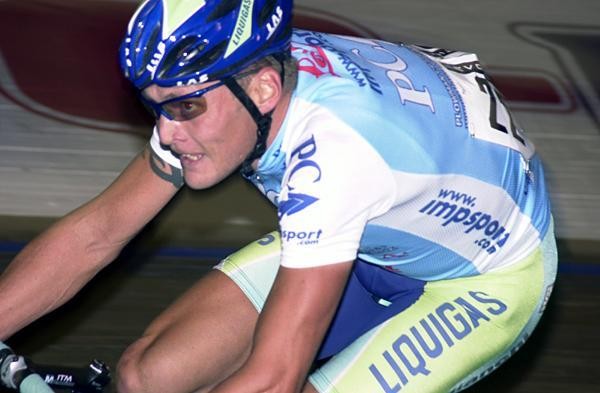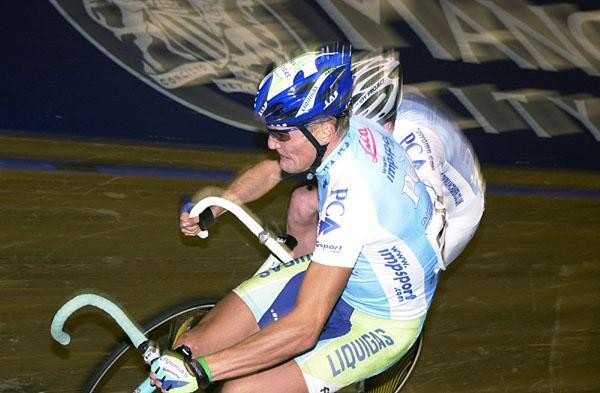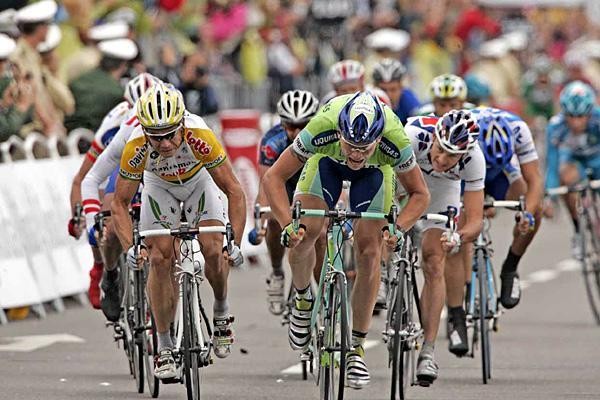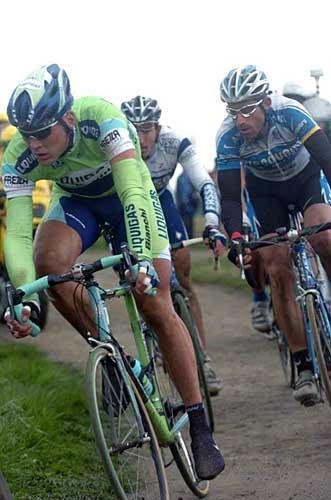Derny ambition: Magnus' hour
Later this week, Magnus Backstedt will tear around the Newport track in the slipstream of a Derny...




An interview with Magnus Backstedt, October 25, 2005
Later this week, Magnus Backstedt will tear around the Newport track in the slipstream of a Derny motorbike, attempting to set a new world record for the paced hour. He spoke to Cyclingnews' Shane Stokes in recent days about his preparations for the record attempt, withdrawing from the Tour and respecting the Vuelta, plus his two big goals for next year.
At 1.93 metres and 90 kilograms, Magnus Backstedt generates one of the highest power output figures in the peloton. The Swedish giant used that strength to race to victory in the 2004 Paris-Roubaix, to place second on stage 7 of this year's Tour de France and to take two other top ten placings in the same race. On Saturday October 29, he will apply that horsepower to another task; namely, to try to improve the 66.114 kilometre paced hour record set by Dutch rider Matthé Pronk last November.
Backstedt has had a varied season to date. He started off well, placing eighth in the Tour de Qatar, 12th in Gent-Wevelgem and 4th in Paris-Roubaix. However overtraining left him severely under par in the Dauphiné Libéré, and while he recovered somewhat to take those high stage finishes early on in the Tour, bronchitis took him out of the race. After recovering he rode the Surrey League Five Day event in the UK in order to prepare for the Vuelta. While he was unable to get close to a stage win in Spain, the days in the Vuelta plus his rides in the world championships and Paris-Tours have provided him with a solid base and fitness level which he hopes to build upon in acquiring the form necessary to beat Pronk's record.
As the final days tick down to the attempt, Backstedt has been working hard to make sure everything is right. "I have been spending a lot of time behind the Derny, trying to find the right gears to use and getting the technique and the confidence to be as close as I can to the motorbike," he told Cyclingnews in recent days. "There is also the whole team thing that you need to work on. The pacer needs to know exactly how I want him to drive, to find the best line for me... what I call the sweet spot on the track. It's where I feel most comfortable and also make the quickest lap times. We have spent a lot of time doing that."
Backstedt started racing way back in January in the Tour of Qatar and so, nine months later, he'd be excused for feeling a bit jaded at this time of the year. He could be taking a few weeks away from the bike like his fellow pros, but instead he's set himself a big target to chase.
"I just really enjoy riding on the track in the winter and I thought this would be quite a fun idea," he said, explaining his motivation for the record attempt. "It will obviously bring some publicity for me, the Liquigas team and the Newport track, which no-one seems to use much for racing. We never see anything on at Newport, everything is always up in Manchester. As a result, I thought that this would be a great opportunity to show that the track is actually really, really quick as well."
Get The Leadout Newsletter
The latest race content, interviews, features, reviews and expert buying guides, direct to your inbox!
Cyclingnews: Before we talk about your record attempt, let's look back a bit earlier in the year. You went into the Tour de France aiming for a strong ride, but ended up pulling out due to illness. At what point was it that you started feeling ill?
Magnus Backstedt: It was about three days before the last rest day. I thought to myself that I would just keep going, get to the rest day, have a day's recovery and then it would possibly clear up and I would be all right to go to Paris. But on the rest day I actually got worse. Then when I woke up the morning of the next stage, the doctor came in had a check on me to make sure everything was in order. He said "you are not starting today, it is getting to the point where it is actually dangerous."
So I spent a week on one type of antibiotics and then went in and had a check up. The bronchitis hadn't cleared up, so I went on a different type of antibiotics. That cleared it up but I was feeling really weak for a while after.
CN: Before that, had you been happy with your form in the race?
MB: Yeah, I was going all right in the Tour. I didn't get a stage win as I was aiming to get, but all in all it was a fairly successful Tour for me. I am never happy unless I win, but with a bit of perspective to it now, it was good - I was up there on a couple of stages, and possibly could have done a bit more sprinting if I had known I would be sprinting that well.
I hadn't actually had the chance up until the Tour this year to actually do a sprint, but all of a sudden I was there and had the legs to sprint. Perhaps if I had trained a bit more that way, or done a few more sprints earlier this year, I could have started to sprint a bit better earlier on. I was leading [Luciano] Pagliarini out for the first for five days and then all of a sudden I got a chance to do it myself... then boom, I had a result. I just built on that.
CN: After pulling out of the Tour, how did you rebuild things?
MB: Well, I spent two weeks on antibiotics. I finally cleared that up, then I had a week to week and a half feeling a bit rough, up and down. I wasn't feeling brilliant, but I was able to ride my bike a little bit. Once I got into it, I found that my form was coming back really quickly. I raced in the Surrey League Five Day in England, then went on to do the Vuelta.
CN: So how did the Tour of Spain go for you?
MB: It finished pretty well. I felt that I was recovering well all the way until near the finish of the race. As a result, I thought I was going to have some really good legs for the World's. However, the last two days in the Vuelta my legs started going flat and I didn't recover in time for the World's. The whole week between the two was strange; one day I would feel really good, but then the next day I couldn't move on the bike. When I got to the World's, I was pedalling really well in the first part of the race but when it got to the stage where I had to put the power down, there was nothing in my legs. I was struggling a bit.
CN: This year there was only a week between the end of the Vuelta and the start of the World's. There had been a longer gap in previous years. As a result, not many guys from the Tour of Spain seemed to be going well in Madrid...
MB: Yes, the only one was really my Swedish team-mate Marcus Ljungqvist, who finished fourth. I think he was the only one who finished the Vuelta and rode well in the road race. It goes to show that if you want to do the World's properly now, you need to pull out of the Vuelta before the finish. That is a shame, so hopefully they will change the date of one or the other to give a bigger gap. I think it is wrong to pull out of the Vuelta just because you are preparing for another race. The Vuelta deserves more respect, as far as I am concerned.
CN: Since the World's you did Paris-Tours and took part in the Revolution track meet in the UK. Did you compete in any other races in that time?
MB: No, they are the only events that I have done. After the World's I went over to the Interbike show in Las Vegas for a couple of days, then came back and started preparing for Paris-Tours. I have been spending a lot of time on the track since then, riding on the boards for a couple of hours each day in order to get my pedalling going again.
CN: What have you been doing there?
MB: Well, I have been spending a lot of time behind the Derny, trying to find the right gears to use for the record attempt and getting the technique and the confidence to be as close as I can to the motorbike. There is also the whole team thing that you need to work on; the pacer Paul Spender needs to know exactly how I want him to drive, to find the best line for me... what I call the sweet spot on the track. It's where I feel most comfortable and also make the quickest lap times. We have spent a lot of time doing that.
CN: The existing record is just over 66 kilometres in an hour. As a result of that kind of speed, I presume the line you will take needs to be quite different than that of the unpaced hour record?
MB: Definitely. On unpaced hour record attempts, you tend to stick on the black line as much as you can because it is the shortest way around the track and therefore the quickest. But behind the Derny, you can't actually keep to that line; it is physically impossible because you get compressed in the corners and actually get pushed up the track. Luckily for me, the bigger you are, the easier it is to ride high up the track. Obviously you are travelling further but you can carry the speed around and you don't get compressed so much in the corners. It is more like riding on a straight line on an open flat road, and that is more suitable for me.
So we are going to sit on the limit of being too high, with the option of dropping down and doing a few laps there if I feel I am starting to run too far behind, or if I want to try to squeeze something out in the last five or ten minutes. In that case we can drop down to the red line, probably. I am not going to go any lower than that.
CN: So have you done tests at record speed, in order to get an approximation of what distance is possible?
MB: I have done tests, yes. The problem now is finding the right gears for me; I need to use a bigger gear than what is standard on the track. I am a power-pusher anyway, I turn quite big gears on the road. So I find that if I am pedalling a little bit too quick, it is the difference of a couple of tenths of a second per lap. And if I go way too quick on a lap it just snaps my legs off, because the leg speed is hurting me more than anything else.
We are currently waiting for some monster chainrings to arrive in order to test them out.
CN: What will you use, do you think?
MB: We are probably looking at a 59 or 60 front ring. As regards the back, I am not too sure yet but I am thinking I am going to run a 13.
CN: That's a big ratio...
MB: Yes, it is. Then again, I have compared that to what the road guys have used on previous hour records - Indurain, Rominger... the specialists on the road. They have all been up there with very big gears. Obviously that is something that suits us road riders more. Matthé Pronk has got the paced hour record now - he is a pretty nippy little fellow and he pedals really high revs on the road and even higher on the track. But I am just going to have to find what suits me best.
[Editor's note: Backstedt originally told Cyclingnews at this year's Interbike he was thinking of a 110 inch gear, the equivalent of a 53x13 gear ratio. His revised choice of gearing, a 59/60x13 - the rough equivalent of a 123/125 inch gear!]
CN: Other riders will be racing the day of the record attempt. What kind of programme is planned?
MB: Well, it is going to be an evening meet. We are starting at 7 o'clock with the presentation and everything, and then we have local British talents doing stuff like scratch races and points races. We have got sprinters doing Keirins and we have got two endurance riders and one sprinter lined up to do a team sprint, like an Olympic sprint. There will be a couple of things like that. In addition, we have got something called a roadman's pursuit, a bit of a Liquigas-Bianchi club championships in the discipline.
CN: Who is taking part?
MB: We have got four of our riders to do that. We will have Marco Milesi, Patrick Calcagni and Dario Cioni coming up, and also Cipo's ex-leadout man Mario Scirea. He is has actually been our sport director for most of the year but he is a big name and people haven't seen him over here at all. He will also be riding. It is all for the show, to enable people to come up and get autographs from these guys - they are never in the UK at all. This is a great opportunity to bring them over.
CN: Should you get the record, what is in it for you? Is there a big cash reward or is it all for the glory of it?
MB: No, it is for the glory of it all. Having a world record is having a world record; it is kind of a cool thing.
I just really enjoy riding on the track in the winter and I thought this would be quite a fun idea. It will obviously bring some publicity for me, the Liquigas team and the Newport track, which no-one seems to use much for racing. We never see anything on at Newport, everything is always up in Manchester. As a result, I thought that this would be a great opportunity to show that the track is actually really, really quick as well.
It is a bit more local for the Welsh people and those from London and the South, rather than having to go up to Manchester.
CN: And you are an adopted Welshman at this point...
MB: Yeah. I know for sure we will put a good show on, so it will be cool.
CN: Have you any ambitions to go for the unpaced hour record at some point?
MB: Well, the thought is there. We will have a bit of a play around this winter and see what sort of figures I turn out, power-wise. It is not out of the question, that is for sure. But that is all in the future, we will look at it when the time is right.
CN: What is planned for the rest of the winter... you said before that you might consider doing a couple of six days...
MB: Well, that is still in the pipeline. If I get into the six days I will be happy to do them, but I am not going to do anything after Christmas this year. I'd like to do some six days before then, but if I don't get into them then so be it. I will just concentrate on training on the road and preparing in a different way for next season.
CN: What goals have you set out? I presume a repeat win at Paris-Roubaix is up there as a priority...
MB: That is the number one goal. In addition, I am going to try to prepare a bit better for the Tour next year. I want to try to make a bigger impact on it. I feel that I have always come up to the Tour flat and not really going the way I should be going to really make an impression.
CN: What did you do wrong this year, do you think?
MB: I over-trained myself! That was the major problem before the Dauphiné... I overdid it, I got to the race and the way I went was shocking, really shocking. I had to have a bit of time off after that in order to try to recover for the Tour. I got to the Tour and I was going okay, but it was on the limit... I didn't have any extra energy in me. Every day, I was absolutely on the limit and that showed when I got sick. Once that happened, that was it.
CN: So the future is all about Paris-Roubaix and a good ride during the Tour?
MB: Yes, that is it.
CN: Finally, Wales is a funny base for a Swede. How do you find it there?
MB: I really enjoy things over here. I have all the training facilities I need and the people are nice... I have friends and everything over here. I have always said that as long as I speak the language, I am pretty happy wherever I live. The people over here - especially the cycling people - have taken me in like I am a home rider, almost like their son. So it is definitely nice to have all this support over here.
I really enjoy it. Sometimes living here makes me travel a bit extra, but at the same time I know that it is a lot easier for my wife and family to be based in Wales. They have got family and friends, someone to help look after the kids every so often. It's good here.
To attend Saturday's race meet in Newport and support Backstedt's record attempt, tickets costing £10 can now be purchased online. They can also be obtained by calling in person to the Welsh Cycling Union Offices at the Newport Velodrome [between 9am and 4pm] or by phone from Sprocket Promotions on +44 01252 815506. A limited number will be available at the door.